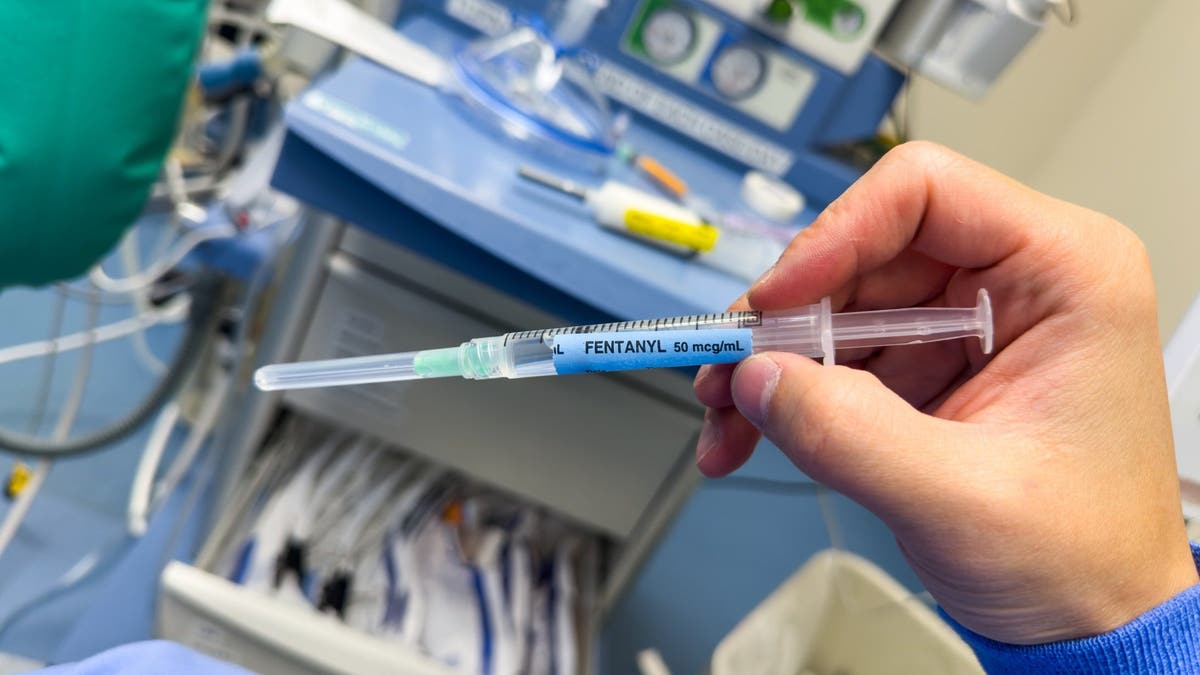‘Fentanyl nexus’: On the streets with Portland Police’s bike squad
As Portland reckons with an ‘explosion’ of open-air drug use, Fox News rode along with the police bureau's bike squad. Here's what we saw in the City of Roses.
Officials at an Oregon hospital believe a former nurse was stealing fentanyl from IV pouches and replacing it with tap water, according to police and local reports. Up to 10 patients have died, the latest example of a nationwide pattern of thefts of the deadly drug from hospital settings.
The families of at least two of those victims told local media the hospital blamed the unsterilized water as a source of infection that led to their deaths.
If investigators confirm a link between the thefts and the deaths, the Asante Rogue Regional Medical Center incident could be the deadliest in a string of hospital fentanyl heists around the country.
Other high-profile incidents have included the conviction of a nurse at the Yale Reproductive Endocrinology and Infertility clinic who replaced vials of fentanyl with saline, probation for a Denver nurse who stole fentanyl from her patients and dozens of charges for a nurse in Hillsborough County, Florida, accused of stealing 17 IV bags of the drug between September and December.
OREGON NURSE ALLEGEDLY REPLACED FENTANYL IV BAGS WITH TAP WATER PRIOR TO PATIENT DEATHS

A Google Maps image shows the hospital where police are investigating the alleged theft of fentanyl. Hospital officials say a thief replaced the fentanyl with tap water prior to the deaths of up to 10 patients. (Google Maps)
Medford Police said they were first alerted in early December and said they are still investigating the hospital's concerns.
Although some patients died after the switch, Medford Police spokesman Lt. Geoff Kirkpatrick said it was too early to say whether the switch had caused any fatalities.
"There is still way too much to uncover in this case for us to be able to make any such statements," he told Fox News Digital.
The Rogue Valley Times, a local newspaper, reported earlier that the families of two patients said they were informed that the tap water led to deadly infections that killed their loved ones.

Health care worker checks IV bag to ensure it is flowing properly. (iStock)
The hospital declined to discuss specifics of the active investigation.
"We were distressed to learn of this issue," the Asante Rogue Regional Medical Center said in a statement. "We reported it to law enforcement and are working closely with them."

A health care worker prepares a syringe of fentanyl in this stock photo. The opioid drug has legitimate uses in a hospital setting but has also been blamed for a rising number of overdose deaths. (iStock)
A 2012 Mayo Clinic study said the theft of prescription medications from hospitals was "not uncommon" and put both patients and hospital workers at "substantial risk." The researchers found that the most commonly stolen hospital drugs were opioids.

Florida ICU Nurse Lisa Williams was accused of stealing 17 bags of fentanyl from her patients between September and December, according to the Hillsborough County Sheriff's Office. (Hillsborough County Sheriff's Office)
Police arrested Florida Brandon Hospital ICU nurse Lisa Williams, 55, in December. She is facing 17 fentanyl trafficking charges and another 17 grand theft charges for allegedly stealing bags full of the drug, replacing their contents with "an unknown substance" and returning them to circulation where she worked.
"It is difficult to comprehend how someone who is supposed to save lives is instead risking them for personal gain," State Attorney Suzy Lopez said in a statement.
In July, Texas nurse Crystal Lipe, 41, admitted to stealing fentanyl for personal use from a hospital in Annona and replacing it with another liquid salt solution, according to the U.S. Attorney's Office for the Eastern District of Texas.
Similarly, in May 2021, a former Yale nurse, Donna Monticone, 49 at the time, was sentenced to three years probation, four weekends in jail and three months of home confinement after she allegedly stole fentanyl out of medical vials with a syringe and injected saline back into them to make them look full. She also surrendered her nursing license.
"It is difficult to comprehend how someone who is supposed to save lives is instead risking them for personal gain."
CLICK HERE TO GET THE FOX NEWS APP
The saline, which was of no help to patients in need of painkillers, was later injected into patients undergoing surgical procedures, according to federal prosecutors. Investigators said about 75% of fentanyl given to patients at the hospital between June and October 2020 showed evidence of tampering.
Monticone allegedly used the stolen drugs for herself, leaving numerous victims to suffer through procedures without the drugs they thought they had been prescribed, according to federal prosecutors.
Yale later paid the federal government a $300,000 civil settlement, according to the Justice Department.
In 2011 and 2012, a medical technician at Exeter Hospital in New Hampshire was accused of stealing fentanyl and contaminating vials that later infected at least 30 patients with hepatitis C, according to federal prosecutors.
Investigators said he had track marks on his arms and that they recovered needles and a syringe from his vehicle. The med tech, David Kwiatkowski, allegedly knew he had the illness and tainted needles that were later used to inject patients with substitute substances, including saline.

